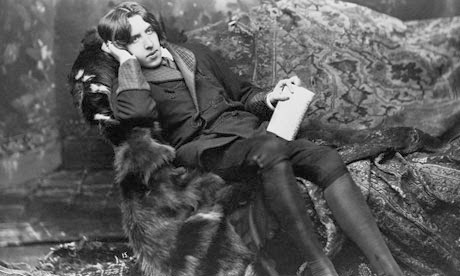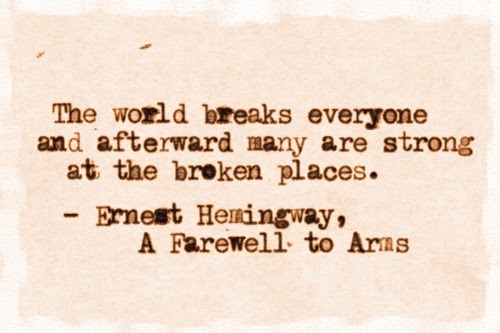Kenneth A. Baldwin's Blog
May 13, 2025
I Have Sharpened My Pen for Moments like This
I have sharpened my pen for moments like this,
Filled the knifepoint with enough ink to poison anyone.
And now that I’m wounded,
Examining my pride like a tire leaking air,
Hearing the sourceless hissing,
I find only that ink is useless in moments like this.
No bodies to stab���and no ears to hear it���
Just the black of the barrel that holds my reserves…
If I could turn it out and dye the world over
Maybe trees would absorb the pitch-colored spew,
And perhaps over time it would climb the trunk
And the trees would be changed for the ink that they’d drunk.
But I store the reserves and dip my nib careful
and shake from the trust that escapes with a hiss.
For I’ve sharpened my pen for moments like this.
I realize that sending a poem without context might be a strange thing to receive in your inbox. But I’ve promised myself I’d share more of my work, and I wrote this poem late at night while I couldn’t sleep because I was struggling over a thorny social situation.
It’s led me to reflect on friendship���its ever-changing borders, and its quiet demands for nourishment and care.
In many ways, being a friend is a strange sort of vow, a promise to compromise pieces of ourselves. It is a self-deceiving exercise, an exchange of emotional commerce that must never be framed as such for fear of losing the deal altogether. It’s a dance from which there is no escape, and we cling to our partners for as long as we’re able.
I’ve struggled with friendship my entire life. I could speak about it for hours and still provide you no definition, let alone offer any tips for keeping such a thing alive.
But here is the paradox that keeps me up at night:
We need it like air.
We cannot make it ourselves.
It requires that we chop up pieces of our heart to trade.
But offering pieces of our heart to others is rarely safe and seldom encouraged. So we disguise them. We dress up these pieces of ourselves in fun little costumes so they hardly resemble the original and hope that we can sneak those pieces of our heart through their defenses.
So that at long last, when the forgery is discovered, so much of us lives in them that humility, forgiveness, and reconciliation have a chance to catch fire.
Despite the imperfections in the product.
Despite the hiccups in delivery.
Despite the wanting method of exchange.
April 24, 2025
Was Tolkien Writing Historical Fantasy Novels?
The other day, my wife and I went to the movie theater for the 20th anniversary of Joe Wright���s film adaptation of Pride and Prejudice. Anyone who knows me���and my opinions on storytelling���likely knows that I consider Pride and Prejudice to be one of the best stories of all time.
And I don���t mean that in some pick-me, I���m trying to impress the ladies kind of way. I mean that narratively, thematically, and in terms of character construction, Austen���s work is simply astounding.
It���s a controversial take, I know, but I also consider Joe Wright���s version to be the best film adaptation to date.
We were sharing this opinion over dinner the other night with some friends, and it somehow led to a debate: was this adaptation of Pride and Prejudice as good as the Lord of the Rings film trilogy?
I argued it was a bit of an apples-to-oranges comparison���but the discussion did raise a fascinating question: was Tolkien as prolific a writer as Austen?
Now there���s a debate worthy of entire semesters of university coursework���not to mention the occasional fervent Reddit thread. But one particular thread of that conversation has stayed with me. A friend asked whether Tolkien truly deserves the moniker ���the father of fantasy.��� In other words, were The Lord of the Rings books really so good that all modern fantasy has been echoing them ever since?
His argument was compelling. He pointed out that Tolkien���s storytelling style is almost antithetical to today���s fantasy trends. Tolkien seemed to abhor violence. Even his most intense action sequences are described from a noble, almost mythic distance���far removed from the visceral blood and bone we���ve come to expect. By contrast, modern fantasy often leans into graphic depictions of combat, with magic systems built for intimate, high-stakes brawls.
Tolkien���s magic system, too, is famously elusive���more whispered myth than defined mechanism. Today���s fantasy readers expect their magic systems to operate with rules so intricate they might as well be cribbed from a board game manual.
So, is Tolkien truly the father of fantasy as we know it?
I���m not sure. But I���d argue he did something for the genre no one had quite done before: he made fantasy accessible, and he did it through allegory and historical resonance.
Tolkien fought in World War I. The Fellowship of the Ring was published in 1954, when the memory of two world wars was still painfully fresh. War wasn���t just history���it was household lore. The mystery and mythology were not in the ancient past, but in the lives of parents and uncles who had returned from the front lines.
By rooting his fantasy in emotional truths and familiar trauma, Tolkien gave readers a way to confront recent horrors at a mythic remove. In many ways, The Lord of the Rings is a historical fantasy novel���not in the sense of direct allegory, but in the sense that it draws from a collective memory still raw with grief and valor.
It���s this grounding���this refusal to float entirely into escapism���that made Tolkien���s work so powerful. He offered readers not just a way out, but a way through. Much like how The Last of Us resonated so deeply after a global pandemic, The Lord of the Rings let readers process their own world through the lens of another.
June 4, 2024
Rebecca’s Ledger: The Month of June, 2024
My Dearest Readers,
I trust this letter finds you well, and I pray you have not been scandalized by the goings-on at this so-called author office thus far. I promise you, dear reader, that things are looking up. Why? Well, because I’m here now.
Allow me to introduce myself properly: I am Rebecca Turner, formerly of the Dawnhurst-on-Severn constabulary, now the indispensable assistant to Kenneth A. Baldwin. Yes, you read that correctly. Kenneth, in a moment of rare brilliance, decided to enlist my unparalleled talents to manage his creative empire of historical fantasy novels. And let me tell you, it’s been quite the adventure.
Our collaboration began with a delightful interview over tea – my suggestion, naturally. Kenneth needed someone to keep his multitude of projects in line and who better than a woman with my experience and penchant for novels? After a few sharp exchanges and a test of wills, he saw the wisdom in my appointment. Now, I keep his creative whims in check while ensuring that he executes his ideas to perfection. I will accept nothing less.
Without further ado, let’s dive in to my new monthly accounting I will henceforth refer to as Rebecca’s Ledger.
Firstly, let’s discuss the Shards of Lafayette Trilogy. This historical fantasy series, set against the backdrop of WWI aviation, follows the adventures of Marcus, a young American combat pilot, and Jane, a British mechanic with a knack for magic. Their relationship forms the heart of the story, making it one of the most compelling historical fantasy books you’ll find. We’ve made significant progress on the second book, and it’s shaping up to be as riveting as the first, “Drops of Glass.” If I can keep Kenneth on track, we hope to publish the second installment this October. From what I understand, this is already a delay from his earlier publication date. Again, fear not, Rebecca Turner is now here to keep things on track. So with any luck, you’ll be diving into enchanting tales of WWI magic by All Hallow’s Eve.
On to Project Foxglove, a delightful new musical we’ve been developing. Kenneth told me that he’s spent many years writing this piece, which renders its recent progress monumental. Soon, the story will be finished, and the music drafted in rough form. To give you a little taste of what’s to come, imagine a Halloween party like no other, where secrets and spells collide, and romance is just a potion away. Yes, it’s as intriguing as it sounds, but I won’t spoil too much. Let’s just say our lead character, Foxglove, finds herself entangled in quite the romantic conundrum, set in a fantasy world rich with wit and magic.
Meanwhile, the antics at Austen University are ever-stimulating. For those who aren’t aware, this TV pilot is a modern-day mash-up of all the Jane Austen novels, set in a university where all the beloved characters coexist. Kenneth had the pleasure of playing Knightley, and the pilot is now in its final stages of post-production. Once completed, the producers will use it to pitch to studios, aiming to secure funding for a full season. Soon enough, you’ll be able to watch it online and revel in the literary magic.
As if managing all this wasn’t enough, I’ve also been orchestrating his other creative ventures. My reporting aside, expect more wonderful blog content from this office soon. We’re also gearing up for a fantasy giveaway, and I’ve been rallying fellow authors to join this magical endeavor. Let’s hope they can keep up.
Going forward, I’ll be providing you with monthly updates on the state of things. Consider it your personal peek behind the curtain of our creative circus of historical fantasy adventures.
So there you have it, my dear readers – another month of keeping the creative ship afloat while maintaining my sanity. Your support and enthusiasm are the fuel that keeps our little operation running, even if I am the one doing all the heavy lifting.
Until next time, remember: behind every great author of historical fantasy books is an even greater assistant.
Warmest regards,
Rebecca Turner
December 4, 2023
It Came as No Surprise I Didn’t Kiss You
I can’t tell you what time I woke,
but it was dark and reality was fuzzy.
I had just been somewhere else
when my eyes cracked and the dream cracked with it.
You’re never far
because we refuse to disagree
on the value of a top sheet.
One reach away
and nothing between us.
But tonight was for time travel.
I wanted to give you at least ten kisses
gently on the lips
while you slept,
a maddening and overwhelming desire
to experience that tenderness.
And for whatever reason
that night in the house we built,
I’d never been more nervous to try.
Butterflied, giddy,
as though you might turn me down,
as though ten years had not stolen
the youth from our romance.
It came as no surprise
that I didn’t kiss you,
that the nerves overcame me
just as they had those years ago.
But now I’m running backward,
delighted not to kiss you,
delighted by my failure,
delighted to feel what is still there between us,
thicker than a top sheet,
what time has failed to erode
and will fail still forever.
The post It Came as No Surprise I Didn’t Kiss You first appeared on Kenneth A. Baldwin.
September 14, 2022
A Farewell to Arms: Why Hemingway’s Work is More Relevant Now Than Ever
This blog post was originally featured on an old blog I managed called Back to Being Gentlemen. That site is now defunct, but on a quick read, I found the content worthy of republication here with minimal edits.
Hemingway is a bit of an acquired taste, but his influence on modern literature is unquestionable. His use of theme has withstood the test of time. Enjoy.
Recently I finished reading A Farewell to Arms, by Ernest Hemingway. It’s a classic novel that recounts the story of an American man who volunteers to enlist in the Italian ranks during WWI. There, he meets a British nurse and falls in love, leading him through conflicting avenues between life and death, duty and freedom.
For those of you who have not read Hemingway, reading this book is a great introduction to his literary style. His punchy dialogue and staccato sentence structure, at times curiously stoic, represent aspects of his signature voice that are already well developed. On a cursory glance, it might seem that Hemingway’s style downplays the work’s dramatic events and cuts out emotional ties. For me, it had the opposite effect.
I read a review of A Farewell to Arms in an edition of the New York Times from 1929 which contrasted Hemingway’s new and modern writing style with the authors of the Victorian Era. Victorian authors, of course, were notorious for flowery prose and indulgent imagery. At times it feels like to enjoy a Victorian author you must enjoy the English language as well as you do a good plot or character. It was an interesting comparison, and it made me reflect on current trends in the entertainment industry.
Compared to Hemingway, is there a characteristic style of our day? How will they categorize our books, films, and movies in the future?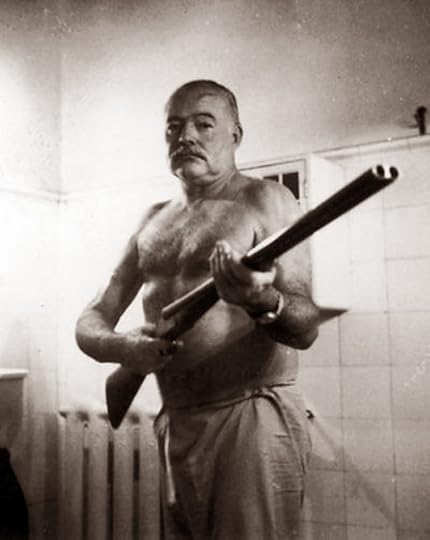
Now, we have a hot and cold relationship with emotional vulnerability. We’ve developed satirical, sarcastic, and irreverent ways of speaking to avoid being vulnerable. Professionalism and perceived reputation stunt emotional communication. We just don’t know how to behave when someone is emotional.
For example, once upon a time, after terrorists hijacked planes and ran them into the Twin Towers on September 11th, Jon Stewart and the Daily Show took a long hiatus. You can imagine the hesitance: what is a satirical news agency to do when there’s nothing to laugh at in the news–when laughing itself cuts against the very values the crew stands for? When Stewart came back on the air, he opened their first return episode candidly, without satire. In his opening monologue, he choked up and fought back tears. He was sincere, vulnerable, and genuine.
Later, in some circles, he was criticized for crying on camera. This man, arguably (and ironically) one of the most influential political identities for an entire generation of young adults, showed his uncontrollable sorrow for one of America’s most impactful tragedies only to be met with ridicule and derision.
On the other hand, despite the harsh, ruthless social media environment (or perhaps because of it) it appears that being genuine has never been valued more highly. An abundance of fake accounts, fake lifestyles, fake this, and fake that, have paved the way for amazing vulnerability to overwhelming support.
Although Hemingway wrote in the rapid and blocky literary style that helped to shape modern literature, I didn’t find that his style detracted from the emotional power of his text. Instead of downplaying the poignant plot elements in his novel, he forced himself to “show instead of tell.” Rather than elaborate with wordy descriptions, he let actions, plot elements, and character motives speak for themselves. His protagonist’s numb response to the traumatic experiences he encountered in the war brings to mind hopeless and lost feelings that I’ve experienced in my own life in the face of crushing adversity.
Can numbness be genuine? Can an author hope to do more for a reader than to stir their innermost recollections without openly asking them to do so?
Hemingway also touches on some provocative themes that gained new meaning during his time period. Perhaps the book’s main theme is a discussion on the contradictory roles of war and love in each of our lives. The pendulum swings between wanting to die for something and wanting to live for something. He discusses episodes of heroism from a soldier’s point of view and contrasts them with heroism from a lover’s point of view. In both cases, he illustrates great sacrifices and sometimes, nonsensical commands, be they instructions from commanding officers or the dictates of the human heart.
The resounding sentiment is very clear. Love is war, and the stakes are just as high.
September 6, 2022
Autumn Has Come a Month Too Early
Autumn has come a month too early.
When I was flying down the road
and a cool breeze slid from its hiding place
to tug at the sides of my shirt,
I could not ignore it.
It was the face of a friend and mentor
rapping my knuckles
to prepare me for its lesson,
as if to say, it’s time to put away summer,
and pay attention.
Autumn has come a month too early,
and I’m not ready.
I cannot play back autumn
as I can the other seasons.
Spring and summer,
even winter,
are cyclical and harmless,
but autumn is the schoolmaster
that demands transformation–
as if to say, can’t you see the trees?
It’s time to shed
that skin you’ve worn
and pay attention.
Autumn has come a month too early.
It wears the cape of the wild unknown.
Why does it swing on its hinges
like a solid door,
impossible to see beyond
until it’s opened and gone through?
Why was music made for fall,
as if to say,
the strings and reeds are now warm enough
to play in minor–
let the dissonance,
the search for resolution,
shape you.
Autumn has come a month too early,
not as though I’ve dread its coming.
But the house is still dirty,
the cake to be made,
and I’m never ready when it arrives.
Yet autumn has come a month too early.
So bring on the rain.
Bring on overcast skies,
the magic of change,
of glowing hearths
and warming range,
that I might claim
its prize.
July 19, 2022
As I Sit Alone at Lunch
Sometimes,
when I sit alone at lunch
many seats comfortably away
from the nearest stranger,
it hits me.
It crushes me.
The nervous anxiety of
a studying student
slowly eating their bowl of ramen.
The giddy, awkward dance
of young love exhibited
by two fearful hopefuls
both freshly showered.
The dutiful expression of industry
on the misfigured face
of a janitor,
a detail that means nothing,
and everything,
doing her job invisibly
among the throngs of the willful blind.
The tired persistence of
the aging groundskeeper as he
bends stiffly over with a flat scraper
to scratch the gum off the pavement.
The friends eating silently,
learning to apologize
one to another and waiting for
the right moment and courage to do so.
The little band of coworkers,
off the clock but not on break
their friendly, talkative supervisor.
The widow with her eyes closed
feeling the presence of something,
of familiarity, or hope, just something,
as she carves new paths for a new life.
The hurting transplant,
looking for service to speak
with the family left behind,
unsurprised but unprepared for the
minute-by-minute struggles of
blazing new trails.
The hungry infant,
smiling and independent,
on the lap of new parents
stealing whatever bites of food
he fancies from his father’s lunch.
The secret holders
who look no one in the eyes
yet long to be discovered.
The mentally ill,
happy to be in the quotidian shuffle,
chasing a day without breakdown,
a day beautifully average
for those not so afflicted.
The winners.
The losers.
The lovers.
The wounded.
And me,
too scared to know them,
too in love not to.
It hits me.
It suffocates me.
It crushes me,
as I sit alone at lunch.
K.A.B.
June 7, 2022
Things Cancer Taught Me
Today is Cancer Survivor Day, which is a day I didn’t know existed until my mom texted me with a heartfelt message of gratitude.
It’s been almost ten years since I was first diagnosed with Stage III Melanoma. I will never forget sitting in a dermatologist’s office with my spouse, looking around at the doctor’s family photos, medical degrees, awards… so many accomplishments on display to remind him of the life he’d been blessed with. I was only twenty-three. I had not yet enjoyed the opportunity to start a family or earn degrees. I watched him squirm uncomfortably as he broke the news to us. I heard my wife ask questions. I felt her hand go rigid as we grappled to understand, stitches from the initial biopsy still itching on my leg. After, over the phone, I heard the adamant resolve in my father’s voice, the fear in my mother’s.
Basically, a small birthmark I’d had my entire life had gone sour, and when I casually mentioned that it was starting to look different to a friend named Chad, his insistence I go see someone saved my life.
My diagnosis was medically awkward. Signs of the cancer’s spread put me between different staging and experts disagreed over what next steps should occur. Against this backdrop of back-and-forth advice, the doctors left decisions up to me, as if somehow I’d know what was right for my body. In the beginning, I opted to lean on the side of caution, and the medical professionals were surprised as traces of cancer showed up in the “just in case” biopsy and the “to be safe” imaging.
Five years later, after what felt like countless medical bills, tests, and treatments, I sat in the car with my dad. He manages a medical imaging center, and I’d just completed a round of screenings with MRIs and PET Scans. One of his doctors called us on our hour ride home and spoke candidly, hedging that this of course wasn’t the official report, but that he wasn’t seeing any signs of Melanoma anywhere. It marked five years since the last evidence of my disease. It was a statistically significant milestone in that the rate of survival for Melanoma patients jumped up an astounding amount. If the cancer hadn’t recurred by that date, it was as close a confirmation as I could get to being cured.
My dad took a hand off the steering wheel and put it on my shoulder. I sat in his passenger seat trying to keep it together. All of the sudden, I was a teenager again, living in a memory of a road trip we’d taken together in his Mini Cooper. The road ahead held possibilities and opportunities. We got back to the house where my wife waited with my mother. It was the beginning of a new life.
I was lucky. And even though my diagnosis could have been far worse, I still experience survivor’s guilt. I don’t like to talk about this because others don’t get to enjoy that moment in the car with the hand on the shoulder and the candid doctor delivering such good news. I am overly aware of that. I walked through the cancer center countless times weighed down by the guilt that I had chosen not to go through radiation therapy, opting instead for a clinical trial with fewer side effects. I witnessed the people around me burn down the jungle to find the tiger inside them. I saw what it did to them. I received messages of support from social workers and invitations to participate in support groups or therapy programs. I never participated. Instead, I busied myself trying to live the most I could live.
It sounds crazy, but I’m grateful for all I went through. Cancer taught me some important lessons that have shaped my life in drastic ways. I share some of them now.
If you believe in God, you must believe He is larger than the boxes we’ve made for HimIt is easy to name God and confine Him to whatever expectations you’ve made for Him. We construct palaces in our minds for God, and though those palaces are as magnificent as our imagination can accommodate, though we may imagine God as wise as we can, the whole point of God is that we can’t comprehend how vast and great He is. Human imagination will never understand. And so when we encounter those things that try us, that put our faith to the test, and we rush to either condemn or exalt ideas, or even people, that resonate or contradict our limited and minuscule understanding of how the world works, we may well find the easiest way to break God is to discover there are no more rooms for Him in the palace we’ve created to hold Him.In bargaining with God, you may discover what you have to offer the world
Bargaining with God is all but inevitable. It happens in our darkest, bleakest moments when we’ve discovered how powerless we are to change our circumstances and how undeserving we are of a miracle. We dig down deep and try to bargain, searching desperately for something that a supreme deity may find valuable. But in that exercise, though our offering will inevitably be found wanting, we also unearth what we cherish most about ourselves, what kernel of potential we believe resides deep down within us. It’s in our hunt to find something to offer God that we uncover what is latently beautiful about ourselves. That is the gem we should have always held up to the world.The present does not exist as a sacrifice for the future
Wise choices about the future abound. Saving for retirement or college accounts. Dieting now for greater health down the line. Taking jobs with difficult hours to gain experience for the future. These decisions are very wise if your top goal is a better future. The problem is these goals often sacrifice the present, and the future is never guaranteed. Life is not to be enjoyed only in retirement or only when you’ve finally landed that big job. Children aren’t only to be invested in once they finish high school. Prudent and wise decisions for the future are never a bad idea, but I include a consideration of the present in my definitions of wise and prudent. Living in a state that feels like waiting is no way to go through life.There is no shield but humor
There are things we hold on to as a shield. They weigh us down. Whether it’s a job or a reputation or a comfort zone, we may cling to things because they help us feel safe in case life takes a dip. While some of these things can certainly help mitigate some of life’s issues, like a savings account or good insurance, they can also block us from the humbling, healthy understanding that the universe in all its might could crush us at any moment. We are too small, and we have no defenses against some tribulation. However, the human ability to laugh at our own misfortune is endless and empowering. Once, I sat in an MRI machine for my third round of imaging in a given day. I was about twenty minutes into the MRI lying there, motionless. The deafening buzzes and whirrings of the MRI were annoying and I felt some minor claustrophobia. They had provided headphones with music anyway. Between phases of the MRI, I could at least catch five, ten, or twenty second-long snippets of a song. The song Radioactive by Imagine Dragons started playing. I lay there and became overly aware of the contrast tracers they had me drink and the fact that it wasn’t safe for the technicians to stay in the room with me. One can cry or one can laugh. I laughed because, come on, what are the odds.There are ways to multiply life: learning, reading, dreaming
We all have one life to live, but there are ways to manipulate how you experience the life you have. For example, studies have shown that the introduction of novelty slows down the perception of time. So much so, that even wearing your watch on the opposite wrist may give you the impression that a day feels longer. Life is full of these delicious little hacks. My favorites are learning, reading, and dreaming. Learning things gives us a greater appreciation for whatever we study. One day, I looked around and realized I loved being among trees and plants, but I couldn’t tell an Oak from an Aspen. I started to learn the names of trees, and suddenly, almost every landscape became a fascinating case study. In reading, you can experience a life completely different from your own, downloading the perspective of a character or author, and multiplying your experience. In dreaming, you can inject yourself with such passion and drive that mundane tasks are supercharged into delightful, almost gameified, activities.Priorities are not made on a whiteboard or with words
When it comes to prioritizing things in your life, daily planners are helpful, brainstorming sessions might get you there, but writing priorities down is about five percent of the effort. Priorities are not decided in a moment, they are evidenced by daily activity and action. It does no good to say your health is a priority if you don’t set aside time each day to prioritize it. Calling something a priority without action is just an exercise in deceiving yourself. It’s a good intention. Good priorities start with good intentions, but it’s amazing how many of our life’s true priorities are unwanted and unplanned.It is worth whatever grief results from giving your whole heart to life
Wanting things and chasing dreams is dangerous. You may fail. Even if you arrive at the place you set out for, you may lose whatever incentive got you there. But I firmly believe that withholding your will, affection, and attention is far more debilitating than whatever grief you experience from eventual loss. There is an opportunity cost to not giving of ourselves completely to life, to not taking full advantage of the opportunities around us.Forgiveness, gratitude, and love are the greatest of all gifts
Finally, I believe that forgiveness, gratitude, and love are the pillars on which we can become our greatest selves. Having the courage to forgive others unburdens us from the hitchhiking leeches of the past. It is a shedding of skin so that our more beautiful form can emerge. Gratitude, ironically, emboldens us to take a greater serving of what life offers. It reminds us that we are owed nothing, and everything is a gift, even and especially the ability to face difficulty and grow from it. And love is power. It connects us to humanity. It renders our time and talent useful. It weaves from our connections with others a net capable of catching all the goodness in the world. It magnifies our compassion to see what we could never see before, and in this greater understanding, our cosmic footprint, our godlike presence in the universe grows.
I try to live these lessons. I fail often. I’m sure I will revise them as life continues, but if I can thank cancer for anything, it is the unique perspective it gave me to recognize these pillars as guideposts. Ambition and opportunity has tempted me many times to deviate, but I’ve never regretted adhering to these principles.
February 1, 2022
Research File: The Panopticon
I use what’s called a nanny cam to make sure my toddler stays in bed all night. It allows me to pull him up on my phone to see that he’s jumping on the bed, tossing his books all over the floor, abandoned his covers and blankets to build a tower with his blocks, or even found the audacity to leave his bedroom altogether. It’s very handy, but at times I’ll check in and see the little guy just staring straight into the camera from across the room. I wonder what he thinks about when he stares at the all-seeing camera. Is he bothered that I can keep such a close eye on him? Is he trying to find a way to see me just as I can see him?
Or does he just like the little red light underneath the lens?
Let’s segue.
This unsettling, creepy crawly sensation that comes with the concept of constant monitoring is not new. Many jokingly refer to George Orwell’s 1984 and say “Big Brother” whenever the conversation topic turns to this whole the government knows what you’re up to idea. But George Orwell was not the first to explore the psychological effects of constant observation.
If you’ve never heard of the Panopticon, keep reading. It’s creepy and cool.
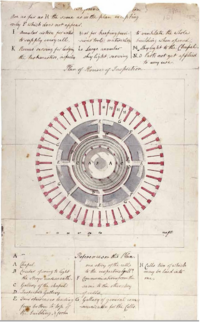
At the end of the 18th century, a guy named Jeremy Bentham came up with this idea called the Panopticon. In a nutshell, The Panopticon behavior control theory meets architectural design. Originally designed for prisons, the layout of this building allows for one security guard to monitor, or rather give the impression he’s monitoring, all prisoners at one time. It consists of a large circle of cells, offices, units, etc, surrounding a nucleus in which stands an inspection house.
Here’s the key. You have a guard in the inspection house. It’s clear to all the prisoners that the guard can see them, but the inspection house is shaded so that the prisoners are never sure when or if the guard is looking at them at any given moment in time. Bentham’s theory was that this would encourage positive behavior.
Could an all-seeing eye, successfully manned by a single person, increase positive behavior on the individual level through the entire prison?
But Bentham’s didn’t care to limit his panopticon idea solely to prisons. He thought the same design would work effectively in asylums, factories, hospitals, schools… any institution in which monitoring everyone easily would have a theoretically positive organizational effect.
Sound like psychological torture? You’re not wrong. And Bentham knew it.
Because of concerns about misusing the power of such a design, Bentham believed that ensuring the inspector at the center of the design was publicly accountable was of the utmost importance. A panopticon for the panopticon, one might say.
The design was not broadly received outside of prison design, but many English prisons were built based on Bentham’s ideas. The British government was particularly interested in using the positive behavioral changes to effect greater labor efforts out of the prisoners. A prison was built trying out Bentham’s ideas called Millbank prison, but the design did not produce the desired effects of greater valuable labor. If anything, Bentham’s designs were the source of blame when officials saw an increase of mental illness among prisoners. It turns out feeling like someone is looking over your shoulder all the time does not in fact increase productivity in the long-term.
Shocker.
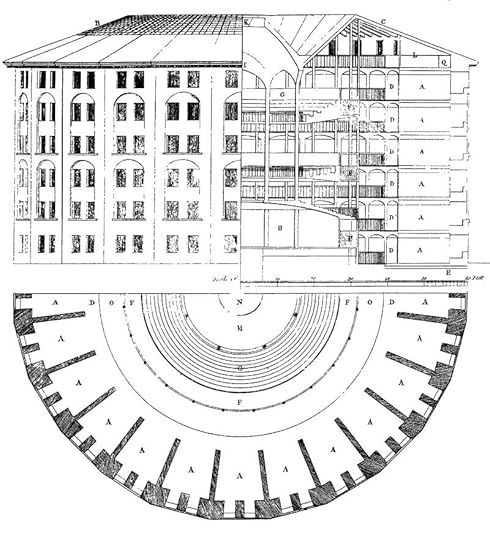
It should be noted that there was nothing nefarious about Bentham’s design. He did not have a goal to make prisoners’ lives worse. If anything, he theorized that conditions would improve through his system enough to improve rehabilitation. It should be noted, for example, that Bentham’s designs didn’t even encourage locked cell doors, or even cell doors at all. He was that confident that his surveillance was more humane than locking men in cages.
It’s possible that Cuba had the best attempt at a functional panopticon prison built a century after Bentham’s death. The Presidio Modelo, famous for housing Fidel Castro, was true enough to Bentham’s designs that cells had no doors. However, overcrowding, lack of funding, and an inconsistent commitment to rehabilitative principles (cough like maintaining livable conditions cough) ultimately failed to create the positive effects Bentham envisioned.
I’ll be frank: I would hate living in such a condition. And yet, the benefits of observing and measuring performance are indisputable. People hire personal trainers to get after them during workouts. We hire mentors and teachers to watch when we are learning something new and correct us as we go along. This constant observation, when desired by the subject, can have significant positive effects. And yet, as soon as surveillance is not consensual, even tacitly consensual, I believe it increases anxiety and stress.
So does my toddler consent to being watched by his nanny cam all night? Who knows? Maybe he’s too busy sneaking out of his room to care.
December 7, 2021
The Picture of Dorian Gray: A Must-Read for Modern-Day
This blog post was originally featured on an old blog I managed called Back to Being Gentlemen. That site is now defunct, but on a quick read, I found the content worthy of republication here with minimal edits.
If you haven’t read The Picture of Dorian Gray, it is one of my absolute favorites. Enjoy my summation!
I recently finished a timeless classic by Oscar Wilde, The Picture of Dorian Gray. Although I was familiar with the premise, it was the first time I had a chance to read through the whole story. It was a quick read, not many pages, but a profound commentary on some ideologies that ran rampant during Wilde’s time. I found that his commentary has a timely and relevant application in today’s world where Web 2.0 (now 3.0, or 4.0, or where are we now?) has exalted the individual to unprecedented levels, and we find our society spiraling deeper and deeper into the throes of exhibitionism, narcissism, and impulse.
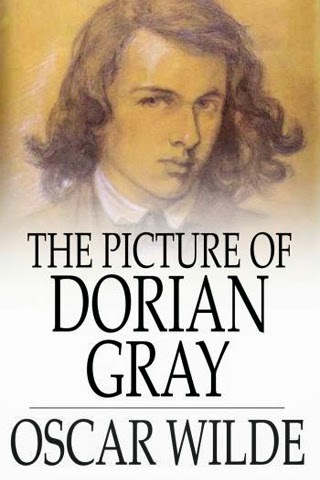
Yes, I know there are a thousand responses to the looming judgement that this next generation is self-centered, but frankly I can’t see how this generation wouldn’t be self-centered. I remember my first time surfing the web, sitting in my parents’ master bedroom. I still recall the charming dial-up noises, raspy and nostalgic. If anyone had told me that one day I would have several different web pages devoted to documenting my life…
And yet here we are.
Because of this new social culture, Wilde’s back and forth about a hedonistic form of aestheticism and a more tempered practice of society’s advancement through beauty is more important than ever.
In the novel, Dorian Gray, the acclaimed most perfect specimen of a young man in the world, is split between the philosophies of his artist-friend, Basil Hallward, and Lord Henry Wotton. Hallward paints Gray’s portrait while he is still in the prime of his years, unblemished from society or corruption of sin or age. He practically worships Gray and, through his creation of art, represents an appreciation of beauty through the advancement of culture. On the other hand, Lord Henry Wotton sees Gray as the perfect vessel to test the limits of hedonism, the pursuit of pleasure without restraint of moral compass or conscience.
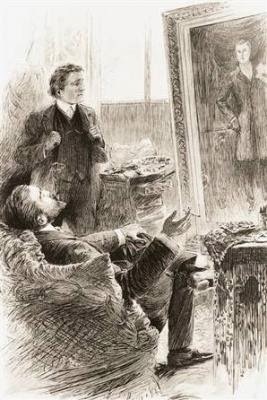
Gray spends the book learning about both sides of beauty’s coin, before Wilde condemns hedonism through the demise of his protagonist, offering a good ole’, “moral of the story” moment. A scholar studying the text summed it up well:
“Aestheticism does well to condemn the renunciation of desires, but it is an excessive obedience to these desires that is subversively dangerous. Therefore, in the practice of Wilde’s aestheticism, forethought and constraint are necessities, yet too often lacking, and without them, one is doomed to suffer the same fate as Dorian Gray.”
Patrick Duggan
Wilde had personal clout with which to approach this story’s motif. The idea of unrestrained pleasure mixing with the traditional values of society was not foreign to him, even at a young age. His father had three children out of wedlock and had them raised with his relatives, apart from his own wife and children, apart from his own, respectable life. This division of family must have had a profound impact on Wilde’s life. It’s reflected in Dorian’s divided lifestyle as well, one with Hallward, respectable and upright, and one with Lord Henry, lascivious and mischievous.

Also, similar to Dorian Gray, Wilde dabbled in all sorts of different methodologies and ideologies, and yet remained aloof to them all. It seemed he was solely interested in acquainting himself with a great number of different cultural experiences. Wilde once received the book Studies from a friend, Walter Pater. It would go on to have a deep influence in his personal philosophy, just as Gray received a book from Hallward that eventually led to his complete corruption. This fascination of contradicting ideas and beliefs led to some uncomfortable clashes internally for Wilde and Gray alike.
Wilde was a man with passions, which he checked himself. He was a firm believer in Christianity, almost going as far as to join the clergy. And yet at the same time, he worshipped art. He spent his entire life trying to reconcile his beliefs and his emotions, interests and desires.
Wilde once said, “I find it harder and harder every day to live up to my blue china.” I think this quotation sums up The Picture of Dorian Gray perfectly.
Now for my own “the moral of the blog post” moments.
I think all of us have made some type of Faustian bargain. It’s as simple as abandoning what we feel to be right in pursuit of what we believe we want. We can’t live in a divided house, though. At which point do we hide our portrait in the attic, in our shame, and continue on, hiding the effects of our poor choices?
It gets harder and harder to live up to the blue china we display on the shelves. How long can we keep the gig up before the china shatters and we’re left trying to sweep up its shattered pieces?
